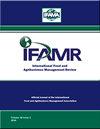转型经济体中的订单农业:利益相关者理论视角
IF 1.5
4区 经济学
Q3 AGRICULTURAL ECONOMICS & POLICY
引用次数: 0
摘要
在转型经济体中,承包耕作被广泛认为是解决影响小农的众多市场失灵问题的一种手段。通过回顾有关订单农业的学术研究,我们发现对其传统的理解是以交易成本经济学和权力动力学为框架的。我们对这些论述进行了批判性评估,并展示了利益相关者理论如何以其对商业的关系性理解,提供了对订单农业更全面的理解。我们认为,利益相关者理论的观点强调了成功的订单农业安排以信任为基础的合作性质。它强调了非正式和道德利益相关者关系的重要性,这种关系弥补了转型经济体执行机制薄弱和法律框架不健全的局限性。因此,利益相关者理论视角下的订单农业突出了其战略管理和商业道德层面,为培养成功的利益相关者关系提供了宝贵的指导。本文章由计算机程序翻译,如有差异,请以英文原文为准。
Contract farming in transitional economies: A stakeholder theory perspective
In transitional economies, contract farming is widely recognized as a means for addressing numerous market failures affecting small farmers. Reviewing the scholarship on contract farming, we show that its traditional understandings have been framed by the narratives of transaction cost economics and power dynamics. We critically evaluate these narratives and demonstrate how stakeholder theory, with its relational understanding of business, offers a more comprehensive understanding of contract farming. We argue that a stakeholder theory perspective underscores the trust-based and collaborative nature of successful contract farming arrangements. It highlights the importance of informal and moral stakeholder relationships that compensate for the limitations of weak enforcement mechanisms and inadequate legal frameworks in transitional economies. This way, a stakeholder theory perspective on contract farming highlights its strategic management and business ethics dimensions, offering valuable guidance for cultivating successful stakeholder relationships.
求助全文
通过发布文献求助,成功后即可免费获取论文全文。
去求助
来源期刊

International Food and Agribusiness Management Review
AGRICULTURAL ECONOMICS & POLICY-
CiteScore
2.90
自引率
0.00%
发文量
0
审稿时长
>12 weeks
期刊介绍:
The IFAMR is an internationally recognized catalyst for discussion and inquiry on issues related to the global food and agribusiness system. The journal provides an intellectual meeting place for industry executives, managers, scholars and practitioners interested in the effective management of agribusiness firms and organizations.
IFAMR publishes high quality, peer reviewed, scholarly articles on topics related to the practice of management in the food and agribusiness industry. The Journal provides managers, researchers and teachers a forum where they can publish and acquire research results, new ideas, applications of new knowledge, and discussions of issues important to the worldwide food and agribusiness system. The Review is published electronically on this website.
The core values of the Review are as follows: excellent academic contributions; fast, thorough, and detailed peer reviews; building human capital through the development of good writing skills in scholars and students; broad international representation among authors, editors, and reviewers; a showcase for IFAMA’s unique industry-scholar relationship, and a facilitator of international debate, networking, and research in agribusiness.
The Review welcomes scholarly articles on business, public policy, law and education pertaining to the global food system. Articles may be applied or theoretical, but must relevant to managers or management scholars studies, industry interviews, and book reviews are also welcome.
 求助内容:
求助内容: 应助结果提醒方式:
应助结果提醒方式:


